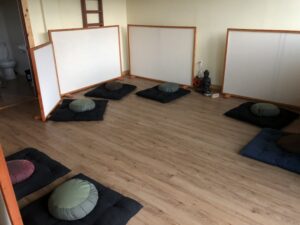 Much of what we do at the Bioreserve when it comes to interweaving contemplative practice into our educational process is modeled after what has been practiced for many centuries in Soto Zen Centers in Japan. The following is taken almost verbatim from Tassajara Mountain Zen Center’s work practice guide, and pretty much all of it applies to life on the farm here in Hawaii.
Much of what we do at the Bioreserve when it comes to interweaving contemplative practice into our educational process is modeled after what has been practiced for many centuries in Soto Zen Centers in Japan. The following is taken almost verbatim from Tassajara Mountain Zen Center’s work practice guide, and pretty much all of it applies to life on the farm here in Hawaii.
As you rush to get a cabin ready for a guest or pull a large swath of hono hono grass out of the fields or are halfway through digging a hole for a new tree, you may wonder how what you are doing relates to Zen meditation practice. It may come as a surprise to learn that work itself is an essential component of Zen training.
For centuries Indian Buddhist monks had been prohibited from working. Instead they were supported by the generosity of their neighborhood lay community. This changed when Buddhism entered China. To the practical-minded Chinese it did not make sense that one group would not work and be supported by everyone else. This was especially true in the Zen tradition. Each member was expected to contribute their labor for the support of the community, monastic or otherwise. Old Abbot Baizhang, after his students hid his tools to spare his aging body the rigors of farm work, shouted, “a day without work is a day without food.” He refused to eat. His students quickly returned his tools. In the 13th century C.E. Dōgen Zenji (the founder of Sōtō Zen in Japan) traveled to China
to study Buddhism. While there he met an old Tenzo (Head Cook) who had walked 12 miles to buy some Japanese mushrooms brought over on Dōgen’s ship. Dōgen was puzzled by the distinguished monk and asked him, “Venerable Tenzo, in your advanced years why don’t you wholeheartedly engage the Way by doing zazen or studying the sutras instead of troubling yourself by being Tenzo and just working? What is that good for?” The Tenzo laughed loudly and said, “Oh good friend from a foreign country, it is clear you have no idea what it means to whole-heartedly engage in the Way.”* When Master Dōgen returned to Japan, he brought with him several distinct practices, which were mainstays of Chinese Zen training. These same practices are the core of our
training here at the Bioreserve. They include the practice of zazen (sitting meditation), learning from whoever is teaching you, following the farm schedule and the Guidelines, and manual labor.
It is pretty typical to see work as only a means to an end, something that has to be done now in order to do the things we really want to do later. But Zen training takes work far beyond this small point of view. The founder of Tassajara, Suzuki Roshi, valued work so highly as to say, “First clean, then zazen.” When work is practice it is seen as part of our zazen (meditation) practice itself. It is an end in itself. Work and zazen go hand in hand. Both are necessary and without one, the other suffers. When work is practice, it is a Buddha doing what a Buddha does, how a Buddha does it.
So when our work is practice, it is less about what we are doing and more about how we are doing it. This particular how in Zen training refers to bringing our zazen, or Zen, Mind to our workplace. “Zen Mind” is a willingness to engage ourselves wholeheartedly in whatever we are doing in the present moment, whether it is making up a bed, cleaning a toilet, chopping a carrot, or serving a guest in the dining room. It is a radical willingness to go beyond our usual limited, small mind; the one that is ruled by its likes and dislikes, its prejudices, narrow points of view and fixed ways of seeing and doing things. The small mind is fueled by habit energy, which says “I don’t like that kind of work,” or “I know all about that.” When we bring our zazen practice into our work, we take a leap out
of that conditioned small mind and into the freedom and generosity of the mind that is accepting, fresh, and full of possibility. This mind is the unfettered mind of a beginner; it is “Beginner’s Mind.”
Volunteers who stay on the farm are integrated into Zen practice both with daily Zazen and opportunities to deepen practice through silent work practice days. During those days, most of our work areas are silent. Silence supports our practice of full engagement and mindfulness. At first, this silence may feel uncomfortable. And just like in zazen, when you notice the mind wandering off into fantasy, criticism, the urge to chat, or any other distraction, you gently but firmly bring it back to the breath, the body, and the task at hand. Even on non-silent days, we invite volunteers to be present with the work in a Zazen way. We discourage tuning out with music or headsets and that volunteers can continue to notice the mind and it’s desires to wander away from the present moment and the task in front of them.
We invite volunteers to explore the challenges and joys of work practice with us, and hope that these experiences will lead to a new self understanding and a healthy new perspective on how work can become part of the path to self realization. And, we bow deeply in gratitude to all who come to our farm for their innumerable labors that support life on the farm and this ancient Way.